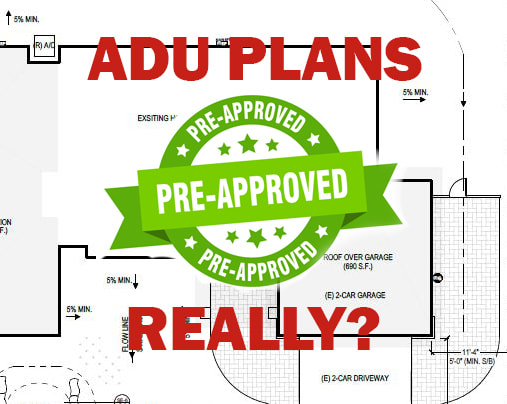|
Pre-Approved or Permit-Ready Accessory Dwelling Plans? A few cities such as Encinitas and San Jose have such programs, but what does it really mean? First off, ADU stands for Accessory Dwelling Unit. It refers to a secondary dwelling in addition to a primary residence. Sometimes they are also known as; a granny flat, guest house or a backyard home. These structures require plans and permits prior to construction. So what are pre-approved and permit-ready accessory dwelling unit plans? Misleading Terms Many people are misled by these two terms; pre-approved and permit-ready. Rest assured it is not what it sounds like. there's probably no drive-thru window at your local building department.What Does “Pre-Approved or Permit Ready ADU Plans” actually mean? Here what it sounds like... “Pre-approved ADU” makes it sounds like the city has a full set of ADU plans that are already stamped and approved for starting construction immediately on your site. This is probably not the case. “Permit ready ADU” also sounds like the city has a full set of ADU plans that already have a permit for you to pick up and use. This also is probably not the case. What It Really Means When a city announces they have pre-approved or permit-ready plans it usually means they have some examples of architectural and structural ADU plans that they would approve if you meet all the conditions. However, these are rarely applicable to everyone. There are a wide range of variables from property to property not to mention from area to area. There is a reason they offer these pre-planned hand-outs as we will see. Please read on... Not A Rubber Stamp In some cases the city has curated plans that have been previously approved for someone else. They would approve them again if you meet all the same requirements. This is rarely ever the case. Although these types of hand-out-plan programs might work for simple patio covers and storage sheds, auxiliary dwelling units are much more complex with tons of variables and code considerations. If the rubber stamp idea came into your mentality it is not a reality. If the definition of pre-approved plans is merely a rubber stamp program then all architects, designers and contractors also have pre-approved plans available and probably more choices than the city would make available to you. Keep reading, we're getting there. No Skipping The Plan Check Process There is no by-passing the plan check process at the city. In order for a city to re-approve these previously approved plans you must first meet all the other requirements for your project. The pre-approved status only applies to a small part of the entire process. You still have to go through the plan check process with a full set of plans including; your existing house, existing lot size and coverage of the main residence, proposed lot coverage information, sediment control plan, floor area ratios, set backs, title 24 energy report, mechanical, electrical and plumbing connections, easements, public works, fire authority, soil reports, homeowner associations restrictions, are just a few things that need to be addressed. Why Do Cities Offer Pre-Approved Plans If They're Actually Not Pre-Approved? The goal behind any city government’s pre-approved or permit-ready plan program is primarily to reduce the amount of time the city spends answering the onslaught of questions from homeowners, contractors and in-experienced designers. It is a blanketing approach, a way that the city can help to convey the acceptable ADU building standards codified in their local jurisdiction. To this end it serves its purpose well. The main goal is not to give you a free set of building plans with a permit card ready to go. Pre-approved or permit-ready plan programs really benefit the building department by helping them to bridge the knowledge gap that exists especially with new legislation. It is a good and proactive way to help inform those who are interested in a granny flat, but it is not meant to be a drive-thru window for your ADU permit. More Accurate Terminology "Hand-Outs" To help avoid misunderstandings most city building departments simply provide what they call "hand-outs" which include examples of acceptable building standards for various types of projects. These hand-outs are common for projects like; water heaters, patio covers, outdoor kitchens, pools, storage sheds and more. Whether distributed online or as a hard copy, they are made available by building departments to help convey the local codes for such projects. With the new California ADU legislation, hand-outs are a common and effective practice by cities to help decipher the new rules they have adopted for accessory dwelling units and junior accessory dwelling units in their jurisdictions. Some of these ADU and JADU hand-outs include examples of floor plans, even structural details, but that hardly makes them pre-approved ADU or JADU plans.
0 Comments
Leave a Reply. |
AuthorChris Doering, co-founder of Truplans Archives
May 2023
Categories |
Corporate OfficesTRUPLANS INC # 203319
630 S. Glassell Street Suite 201 Orange, California 92866 888-778-2737 714-289-4652 Areas Servicing State of California (entire state) Coming Soon Dallas, Texas |
|
All rights reserved. Copyright C.E. Brandcast 2024 for TRUPLANS INC.
This site developed and managed by C.E. Brandcast, a video production/marketing company
that produces custom niche media for casting brands into their niche market space.
All media including photography, videos, virtual tours and computer graphics are the property of C.E. Brandcast.
This site developed and managed by C.E. Brandcast, a video production/marketing company
that produces custom niche media for casting brands into their niche market space.
All media including photography, videos, virtual tours and computer graphics are the property of C.E. Brandcast.



 RSS Feed
RSS Feed

